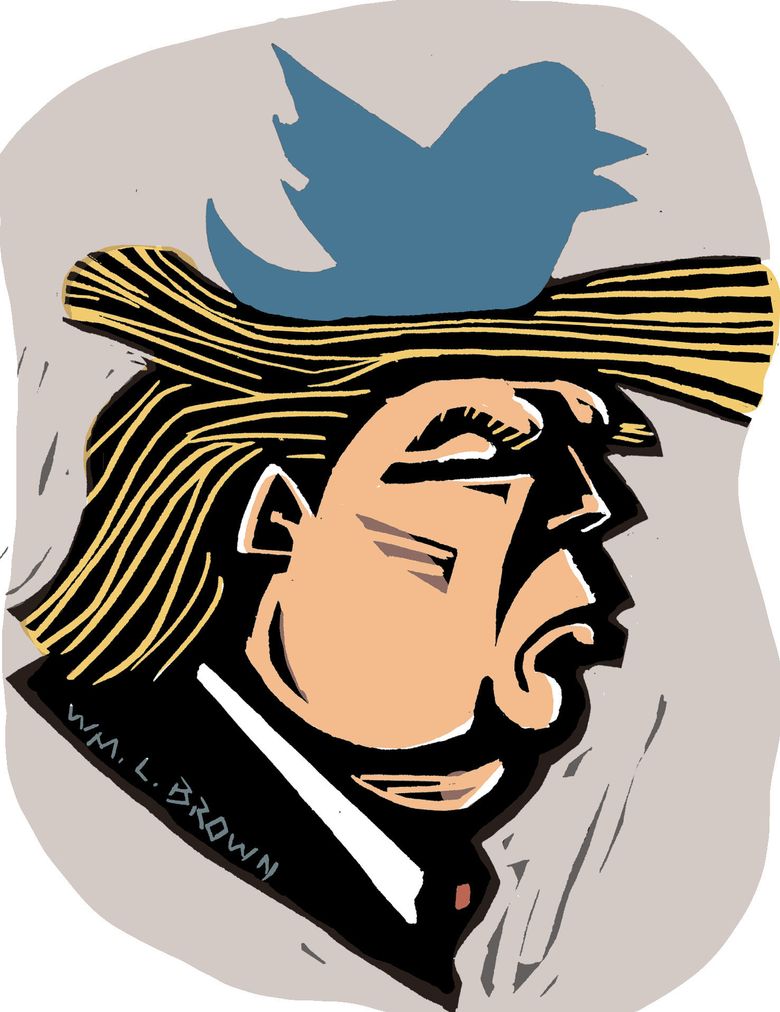
Trump’s tweet on protests of George Floyd death earns him another Twitter flag
by Jon HealeyYou have to hand it to Twitter CEO Jack Dorsey: He may have been lured into an unwinnable election-year fight with President Trump, but at least he’s still throwing punches.
Shortly before 1 a.m. Friday on the East Coast, Trump verbally barreled into the hot flaming mess on the ground in Minneapolis, where protests over the death of George Floyd had turned violent. A bystander’s video shows an unarmed Floyd, who is black, being suffocated by a white cop who was arresting him for allegedly using a forged $20 bill at a grocery store. The killing has prompted protests around the country against police officers’ excessive use of force.
Trump had expressed concern Wednesday on Twitter about Floyd’s killing, writing that he had initiated a federal investigation into the “very sad and tragic death” and promising, “Justice will be served!” But his tone was completely different Friday, as television news channels broadcast footage of looting in Minneapolis:
“When the looting starts, the shooting starts” is classic Trump: jargony macho bluster that’s menacing but vague enough for him to deny any overt threat. It doesn’t take much imagination to read into the tweet that Trump is talking about the police opening fire on looters, but he also dangled the possibility of sending in “the Military” (federal law bars him from deploying the military to enforce state laws, but governors can and do call in the National Guard to quell disturbances). Oh and yes, “THUGS” is a dog-whistle too.
Twitter responded by flagging the “THUGS” tweet for violating its rules against glorifying violence. And it went a step further than it had Tuesday, when it flagged a two-tweet Trump thread on mail-in ballot fraud as misleading: It hid Trump’s words, requiring Twitter users to click one more time to see them. Nevertheless, it decided not to delete the president’s screed because, it said, “it may be in the public interest for the Tweet to remain accessible.” Naturally, Twitter has a rule for that.
Points for chutzpah. The new flag came just hours after Trump, asserting that Big Tech was biased against conservatives, signed an executive order that aims to weaken the liability shield that federal law provides Twitter and other online platforms for user-generated content. That order had been in the works for a while, but its release appeared to be triggered by Twitter’s action against Trump on Tuesday — the first time it had ever flagged a tweet by the Terms and Conditions Violator in Chief.
Advertising
The order is a mean-spirited and self-defeating overreach that probably won’t survive the court challenges that will inevitably come. Nevertheless, it’s a big swing by Trump aimed directly at Twitter and its ilk, and to its everlasting credit, Twitter didn’t duck.
And yet Twitter can’t possibly win here. The fight energizes and emboldens Trump, a self-styled counterpuncher who likes to leave marks. The White House’s official account retweeted Trump’s offending tweet Friday morning; after it, too, was flagged, the White House tweeted this: “This Tweet violated the Twitter Rules about glorifying violence. However, @Twitter has determined that it will allow terrorists, dictators, and foreign propagandists to abuse its platform.”
And therein lies Twitter’s problem. For all of the criticisms by conservatives about Twitter bias, it’s actually quite permissive and reluctant to remove content. Its rules give it a lot of leeway in that regard, which at the end of the day makes the company look erratic. Those on the receiving end of a Twitter rebuke can legitimately ask, “Why me?” because there are countless examples of line-crossing content that does not get flagged or taken down. And some of those folks are going to answer that question, “Because Twitter is biased.”
This is yet another illustration of the flip side of scale. Enforcing Twitter’s terms and conditions was a manageable task when there were a manageable number of tweets. Those days are long gone.
So for the rest of Trump’s time in office, we can expect Trump — an extraordinary troller — to test Twitter’s limits whenever the president is feeling his oats or looking to shift attention away from something else he’s bungled. And from time to time, Twitter will flag one of those tweets, and the cycle will begin again. Rinse, lather, repeat.
Jon Healey is the deputy editorial page editor of the Los Angeles Times.